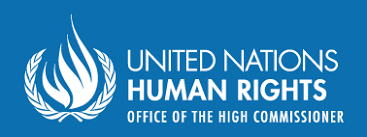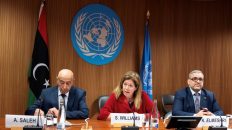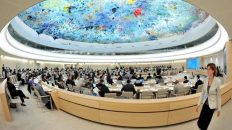Geneva:18 January 2022
The human rights situation in Sudan continues to be of serious concern, with peaceful protesters killed or injured on a near-daily basis by security forces, as well as a clampdown on critics of the authorities and on independent journalists.
Credible statistics from the Central Committee of Sudan Doctors show that 71 people have been killed and more than 2,200 injured by State security forces during protests since the 25 October 2021 coup d’etat. Of these, 17 were killed just since the beginning of this year. Yesterday alone, security forces brutally dispersed demonstrators in Khartoum, resulting in the killing of seven and injury of dozens of protesters by live ammunition.
Our Joint Human Rights Office in Sudan has also noted a pattern demonstrating that more than 25 per cent of those injured were hit directly by teargas canisters. This raises concerns that security forces are firing teargas canisters horizontally, directed at individuals, in violation of international standards.
We repeat our call on the Sudanese authorities to immediately cease the unnecessary and disproportionate use of force – including the use of live ammunition – against peaceful protesters. The use of live ammunition is only permissible as a measure strictly of last resort in case of an imminent threat to life or of serious injury. There need to be thorough, prompt, independent investigations and the authorities have a duty to ensure that perpetrators of human rights violations are brought to justice.
A campaign of arbitrary arrest and detention against protesters, journalists and media workers continues amid the state of emergency, with security forces breaking into activists’ homes, and even entering hospitals to arrest wounded protesters, preventing them from accessing emergency care. There are also disturbing reports of assaults against healthcare workers and facilities.
The clampdown on freedom of opinion and expression also appears to be increasing through arrests of journalists, home and office raids and searches, ill treatment of journalists and suspension of licences. At least eight journalists have been ill-treated by security forces while covering protests.
On Saturday, 15 January, the broadcasting licence of Aljazeera Live – the Arabic-language live news and events channel that is part of the Aljazeera Media Network – was revoked. On 13 January, Sudanese armed forces reportedly entered the office of Al Araby Television in Khartoum, arbitrarily arresting four of its staff while they were covering a protest from the rooftop of the building. On 30 December, police and joint security forces including Rapid Support Forces stormed the offices of AlArabiyah and AlHadath Television channels in Khartoum while they were covering protest marches in Khartoum. During the raid, they beat and harassed staff with batons and damaged office property.
We call on the Sudanese authorities to stop targeting journalists, to ensure that the rights to freedom of expression and peaceful assembly are fully respected, that peaceful protests are facilitated rather than met with unnecessary and disproprotionate force. Journalists and media organizations should be able to go about their crucial work freely and safe from any harassment and intimidation.
As the High Commissioner for Human Rights has stressed, meaningful, inclusive, participatory dialogue is urgently needed to ensure a swift return to civilian rule in Sudan. The people of Sudan must be able to participate in shaping the future of the country.






